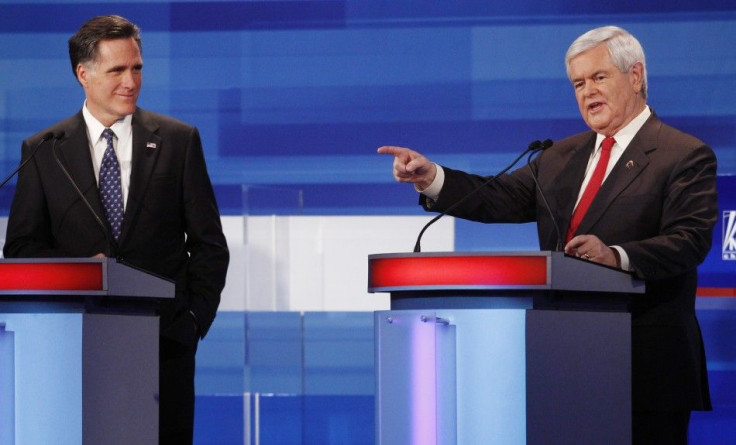Gingrich and Romney Super PACs Fuel 2012 Fight
Analysis

The 2012 race for the White House has featured the typical partisan sniping, smear campaigns, verbal jousting and stump speeches. But a new idiom has formed around the expected rigors of a presidential campaign. In the past, having friends in high places offered campaign mojo via endorsements. Now, fat wallets have become the lucre of choice.
If the current Republican primary has taught us anything, having rich supporters with high expendable incomes has become the difference between first and fifth place. Thank the Supreme Court. Its controversial Citizens United decision has prolonged the shelf life of candidates that once would have been long dead. Ask Newt Gingrich.
The former Speaker of the House's supporters, as well as the candidate, began a scorched-earth attack in South Carolina on Monday against presumed frontrunner Mitt Romney. First, a mini-documentary hit against the former Massachusetts governor's tenure at Bain Capital, portraying him as the exemplar of all economic ills. Next, an ad funded by Gingrich depicting Romney as a pro-abortion governor.
In 2010, the Supreme Court decided businesses, unions and corporations have the same free speech rights as individual citizens, lifting previous caps on campaign donations. Super PACS, at the heart of the case, became a haven for anonymous donations of previously unimaginable sums from individuals and corporations. The groups are allowed to coordinate campaigns without the knowledge of the candidates they support, with little restrictions; a shadow campaign operation propping up candidates with deep-pocketed support.
The mammoth anti-Romney attack is largely funded by a pro-Gingrich Super PAC, called Winning Our Future, and is set to spend $3.4 million on TV and radio ads. And it is an act of revenge.
As of Dec. 13, 2011, Gingrich held a commanding lead in the polls over the remaining Republican field, to the tune of 35 percent, according to a poll conducted by the Pew Research Center for People and the Press. His closest competitor, former Massachusetts governor Mitt Romney, lagged behind, polling at 21 percent among potential voters. The ensuing weeks displayed the veritable might of what untethered corporate money can do to a campaign.
Romney's face became ubiquitous in living rooms and during dinner conversations. TV and radio ads chopped away at Gingrich's record as Speaker.
Super PAC Strikes: First Romney's, Now Gingrich's
The former Massachusetts governor ranked as the highest spender of the onslaught, pouring $2.86 million in campaign cash into the TV and radio ads. The next closest? The pro-Romney Restore Our Future Super PAC, with $2.85 million in ad money spent, essentially doubling Romney's efforts. Overall, Super PACs poured $10 million in ad money into the Hawkeye State. Gingrich hardly stood a chance.
His lead vaporized by the Jan. 3 caucuses, dropping 20 points and coming in fourth, behind surprise runner-up Rick Santorum and libertarian Ron Paul. Such plummets in the polls have precedents, but are usually linked with controversial histories emerging (see: Herman Cain). Gingrich's fall was precipitated by nothing short of a critical mass of repetition: stale information and negativity reigned supreme. He didn't forget.
In the 2012 Republican primary season, eye for an eye funded by big money appears the norm. That reality came to fruition with the newest donor to the pro-Gingrich Winning Our Future Super PAC.
After the Iowa drubbing, the former House Speaker's supporters lobbied the candidate's longtime friend Sheldon Adelson, a casino magnate and one of America's richest men. On Friday, Winning Our Future got a $5 million check from Adelson, according to The New York Times. By Monday, the $3.4 million Romney attack campaign had become a reality.
For 11 days, South Carolina's voters will be subjected to the outcome of Winning Our Future's largesse -- another barrage of attack ads funded almost single-handedly by Adelson.
The billionaire's connections to Gingrich span two decades. In essence, they're pals. Who could turn down a bit of help from an old chum?
If he wants to counterbalance Romney's millionaires, said Gingrich, I have no objection to him counterbalancing Romney's millionaires.
Therein lies the sinister aspect of Super PACs. Despite operating with the sole purpose of bolstering a candidate, the recipient of a Super PAC's goodwill can wash his or her hands of the whole mess. The uglier bits of campaigning can largely be fought by proxy, with zero accountability.
America, welcome to the reality of post-Citizens United campaigning. Get ready for more.
--
© Copyright IBTimes 2024. All rights reserved.





















